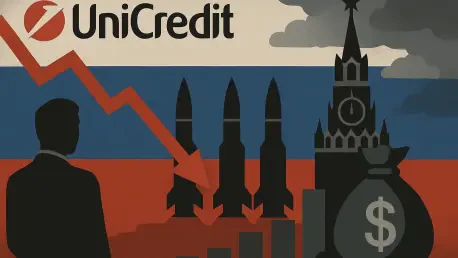In today’s global financial landscape, the intricate relationship between international financial investments and geopolitical tensions has become a focal point. UniCredit’s investments in Russia, particularly in sovereign bonds, reflect this complexity in a world where international sanctions are on the rise. As financial markets navigate a landscape shadowed by regulatory and geopolitical challenges, understanding UniCredit’s strategic engagements paints a broader picture of potential risks and rewards in these tumultuous times.
UniCredit’s Strategic Position and Market Movements
UniCredit, a heavyweight in the European banking sphere, has strategically expanded into emerging markets, with Russia featuring prominently in its expansion playbook. Historically driven by the forces of globalization and cross-border investments, UniCredit’s trajectory has been rerouted by the evolving geopolitical narrative. Sanctions targeting Russia, especially due to the ongoing conflict in Ukraine, necessitate a recalibration of operational strategies and risk assessments. As these dynamics unfold, they shape not only the challenges but also the strategies UniCredit must adopt to sustain its business model amidst volatile geopolitical scenarios.
Insights into UniCredit’s Russian Investments
Examining Financial Exposure and Risk
UniCredit maintains substantial stakes in Russian sovereign bonds, a strategic choice laden with potential perils given the current sanctions landscape. Despite a strategic reduction in this exposure, significant investment remains. Industry perspectives reveal that intensified sanctions could jeopardize UniCredit’s financial stability. This scenario underscores a pivotal question: do the rewards of maintaining Russian investments justify the risks from sanctions and regulatory challenges that may ensue?
Italian Government’s Economic Safeguards
The Italian government’s actions, such as blocking UniCredit’s acquisition of Banco BPM, serve as a testament to its cautious approach toward capital flows into Russia. By imposing restrictions, the government highlighted its commitment to safeguarding national economic interests amid international tension. This interference, characterized by the use of “golden powers,” disrupted corporate ambitions and offers an intriguing case study on balancing national security concerns with market activities. Comparative assessments with global governmental maneuvers offer fresh perspectives on capital flow control in politically charged zones.
Navigating Regional Economic Dynamics
UniCredit’s journey into the Russian market is fraught with challenges shaped by unique regional and market-specific variables. Industry experts explore methodologies that aim to cushion financial institutions from geopolitical shocks, from nurturing local alliances to adopting sophisticated financial solutions. Addressing misunderstandings, such as the notion of swift market exits, adds depth to the strategic considerations at banks’ disposal as they operate within sanction-imposed constraints.
Future Pathways for Financial Growth
In an era defined by rapid evolution, banking institutions like UniCredit encounter transformations reshaping economic landscapes. The escalating trend of digitalization, potential policy amendments, and economic shifts driven by geopolitical pressure paint a vivid future for the banking sector. Tighter regulatory structures promoting transparency and ethical global business practices could become more prevalent, supporting a framework where growth mirrors conscientious compliance. Understanding these shifts positions financial entities to thrive amid global complexity and ambiguity.
Resilient Strategies for UniCredit
It was imperative for UniCredit to deploy a well-rounded approach, mitigating Russian market vulnerabilities while aligning with international guidelines. Prioritizing compliance and technology integration would have heightened UniCredit’s adaptability to shifting regulations. Developing robust oversight capacities and engaging in international dialogues could have ensured operational resilience. These insights empowered decision-makers, equipping them to navigate the evolving challenges within the global financial landscape.
Final Considerations and Strategic Reflections
The discourse surrounding UniCredit’s Russian engagements encapsulated broader themes of global finance intertwined with geopolitics. These ongoing discussions illuminated the intricate nature of designing international banking strategies within shifting political contexts. Reflecting on these insights, it became apparent that sustainable financial growth required strategic robustness and proactive governance. In the quest for commercial success and stability, achieving the delicate balance between lucrative pursuits and stringent compliance remained crucial.









